
Related
Topics
Guests
- Kareem ChehayebBeirut-based journalist reporting on Lebanon, Syria and Iraq for the Associated Press.
Syrian opposition forces have seized most of Aleppo after launching a surprise offensive in recent days that ousted government forces from the country’s second-largest city. The offensive is being led by an armed group called Hayat Tahrir al-Sham, a former al-Qaeda affiliate that cut ties with them in 2017. Syrian and Russian forces have retaliated with airstrikes on rebel-held areas, with the London-based Syrian Observatory for Human Rights reporting 446 deaths in Syria since Wednesday. The rebel advance into Aleppo is the most significant turn in the Syrian civil war since 2020, when rebel forces were forced to retreat to Idlib. The offensive was launched at a time when the key backers of Bashar al-Assad’s government — Russia, Iran and Hezbollah — are also focused on other conflicts. “It was a surprise offensive that people did not expect at all,” says Associated Press reporter Kareem Chehayeb.
Transcript
AMY GOODMAN: This is Democracy Now!, democracynow.org, The War and Peace Report. I’m Amy Goodman.
In Syria, opposition forces are pushing towards Hama after launching a surprise offensive to seize most of Aleppo, Syria’s second-largest city. Syrian and Russian forces have retaliated by launching air attacks on the rebel-held cities of Idlib and Aleppo, a city where rebels were driven out eight years ago by Bashar al-Assad’s forces. The London-based Syrian Observatory for Human Rights reports 446 people have been killed in Syria since Wednesday. The offensive is being led by an armed group called Hayat Tahrir al-Sham, which grew out of the Nusra Front, which had ties to al-Qaeda and the Islamic state. The rebel advance into Aleppo is the most significant turn in the Syrian civil war since 2020, when rebel forces were forced to retreat from Idlib. The offensive was launched at a time when the key backers of Assad’s government — Russia, Iran and Hezbollah — are also focused on other conflicts.
For more, we go to Beirut, where we’re joined by Associated Press reporter Kareem Chehayeb.
Thank you so much for being with us. Can you explain what you understand took place this weekend, Kareem?
KAREEM CHEHAYEB: So, it was a surprise offensive that people did not expect at all, this insurgency led by Hayat Tahrir al-Sham, but there were also other factions and armed groups, including those backed by Turkey. They swept through villages and towns across northwestern Syria, and they made their way into Aleppo. It really appeared early on that they faced virtually no resistance in their insurgency. And they collected vehicles and munitions left behind by the Syrian Army in parts of Idlib province that were under the government’s control.
Over the past two days, we’ve seen a counterinsurgency from the Syrian government, backed by Russia. They’ve launched airstrikes in the areas where the insurgents are present, whether it’s in Aleppo or in Hama, northern Hama province, but also in Idlib, including the city. And this is — the northwest of Syria is basically the last opposition-held bastion there. It appears also the Syrian government and the Army have created like a very strong defensive line in northern Hama. It seems soldiers are trying to sweep into the area to clear forces out. Numbers are still pretty murky, as well. The Syrian Army said today that their airstrikes alongside Russia killed some 400 insurgents. We’re not really sure about numbers of displacement, but there are concerns that it could be thousands, if not tens of thousands, of people displaced. We’re trying to get clarity from that as soon as we can.
And there’s a lot of questions surrounding the political implications in Syria. The Iranian foreign minister was in Syria yesterday, met with President Bashar al-Assad, reiterated Iran’s full commitment to supporting Syria, as it has for the entirety of this conflict over the past well over a decade now. And today, upon the Iranian foreign minister’s visit to Turkey with his counterpart, it appears they’re trying to kick off, you know, diplomatic talks, which has been sponsored by Russia, which has over the years tried to bring Turkey and Syria back together in terms of restoring diplomatic ties. So, the coming days will be very crucial in terms of what happens on the battlefield and whether there will be political implications to this surprise attack.
AMY GOODMAN: And can you talk about the main group, that seems to have distanced itself from al-Qaeda, claims not to be sectarian? What is your understanding of this group?
KAREEM CHEHAYEB: So, Hayat Tahrir al-Sham did grow out of Jabhat al-Nusra, which was the al-Qaeda affiliate in Syria. And they basically are the most powerful group in the northwest Syria, notably in Idlib province. Over the years we’ve seen that their leader, al-Julani, has tried to take on a different image. You know, they’ve tried to appeal to minority groups, and you can even sort of see this right now in how they’re going about areas in Aleppo that are majority Christian or Syrian Kurdish, and they’ve sort of said that they’re not there to harm them and that they are — you know, they’re all Syrians and so on, more of a nationalist kind of language in their approach. That being said, there is mixed reporting about how the militants are treating the local residents, so it’s still very unclear. We’re trying to get confirmation on that. But what we do know is that al-Julani and Hayat Tahrir al-Sham, in particular, have tried to change their — change public perception about them, particularly from non-Muslim, non-Sunni minorities, notably the Christians, the Kurds and the Druze, in recent years.
AMY GOODMAN: I wanted to also ask you about your reporting. I mean, you’re talking to us from Beirut. You filed a report Sunday about an Israeli airstrike in southern Lebanon, this despite the ceasefire.
KAREEM CHEHAYEB: Yes. So, the ceasefire went into effect last week, but the next 60 days — the first phase of the ceasefire appears to be very rocky. So, during this period of time, Hezbollah is supposed to withdraw its forces from southern Lebanon to the north of the Litani. And the Israeli military has presence and control of dozens of villages and towns in southern Lebanon, and they’re still there. And the goal is for both of them to withdraw and to push deployment of the Lebanese army to ultimately become the sole armed presence of southern Lebanon alongside United Nations peacekeepers. That being said, there have been dozens of instances where Israel has struck parts of southern Lebanon and parts north of the Litani. There have been reports of Israeli jets, overflights, drone overflights, and this has pretty much frustrated the Lebanese government, the army.
Now, it’s really unclear what measures they’re going to take. Hezbollah has been very quiet on that front since the ceasefire. They’ve been focusing a lot on commemorating Hassan Nasrallah, their leader, who was killed by an Israeli airstrike back in September, doing some community work and that sort of thing. We do know that the army has been very public about these violations, particularly ones that have struck military personnel, and that they say they have complained, and the Lebanese government is doing the same, apparently.
This is a really big test for the new monitoring framework for the ceasefire, which is headed by the United States and is supposed to bring life back into this U.N. Security Council resolution from back in 2006 which they’re trying to have implemented right now. It’s really unclear what the Lebanese government is going to do beyond that, whether they’re trying to put the trust into the system and hope that Washington will ask the Israelis to maybe — you know, to stop these overflights and these attacks. It’s really unclear. But over the past few days, these issues are still continuing. And it has brought some doubt among some people in Lebanon about whether this ceasefire can hold.
AMY GOODMAN: Kareem, we’re going to have to leave it there.
KAREEM CHEHAYEB: The Israelis have not commented on —
AMY GOODMAN: We hope to do a post-show interview with you.
KAREEM CHEHAYEB: Yeah.
AMY GOODMAN: Kareem Chehayeb is the Beirut-based journalist reporting on Lebanon, Syria and Iraq for the Associated Press.
A belated birthday to Deena Guzder! I’m Amy Goodman.

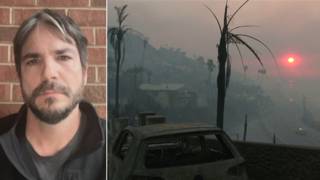
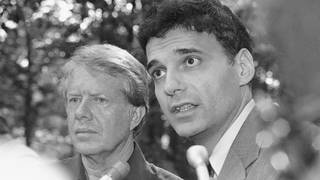
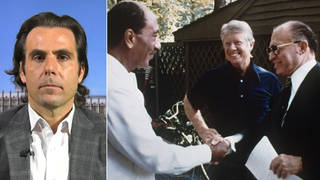
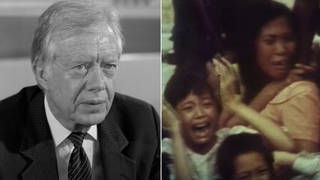





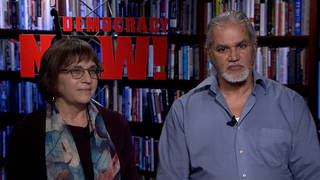
Media Options